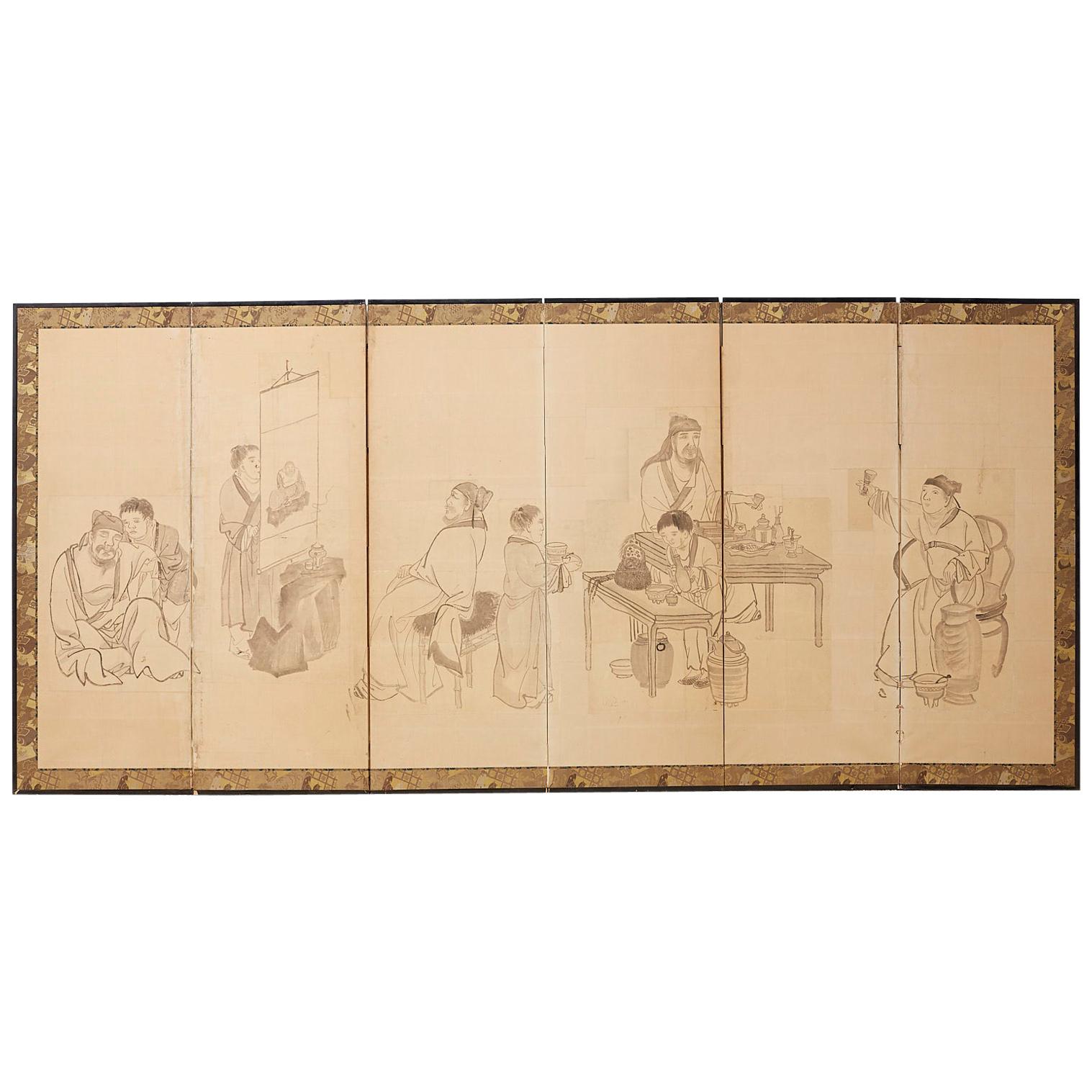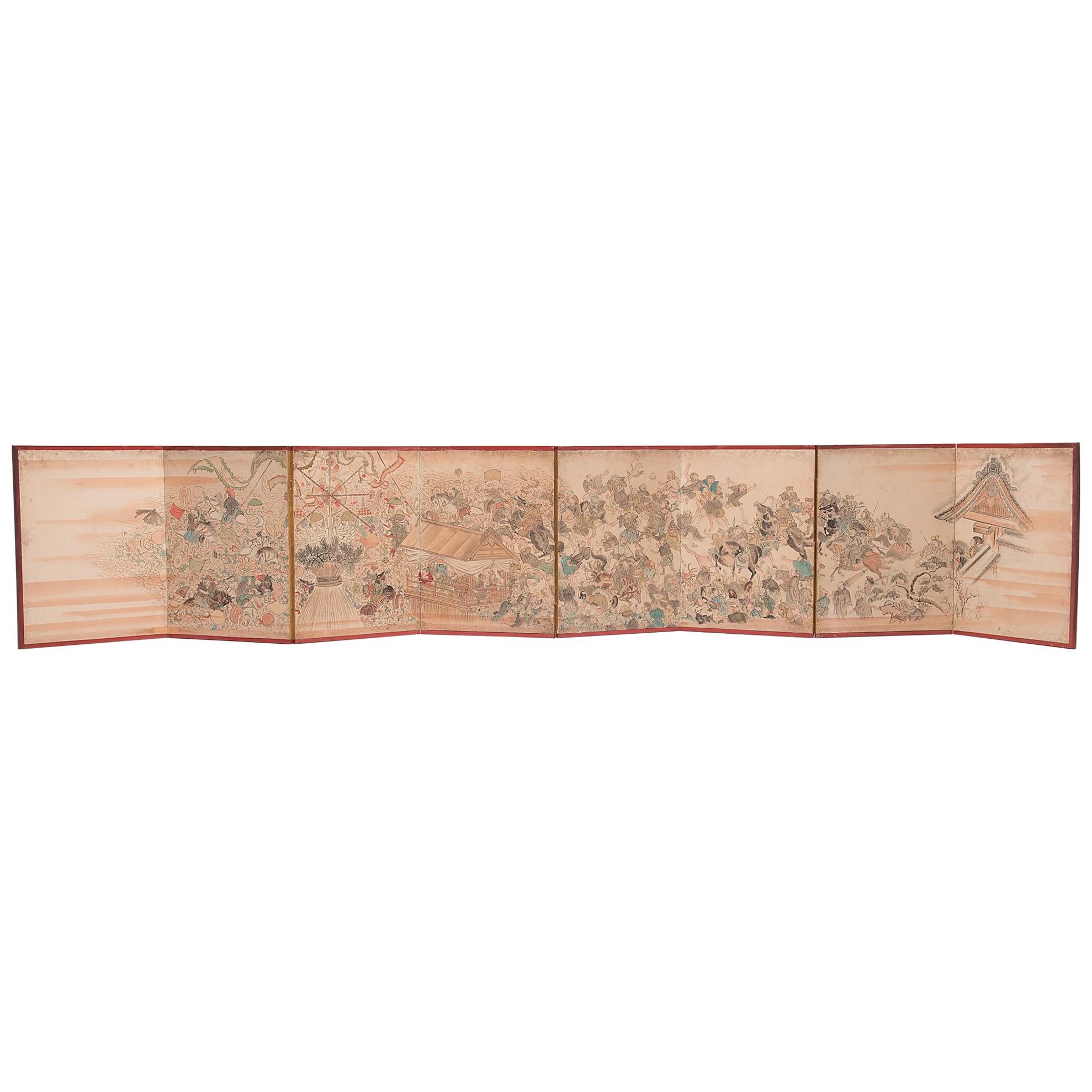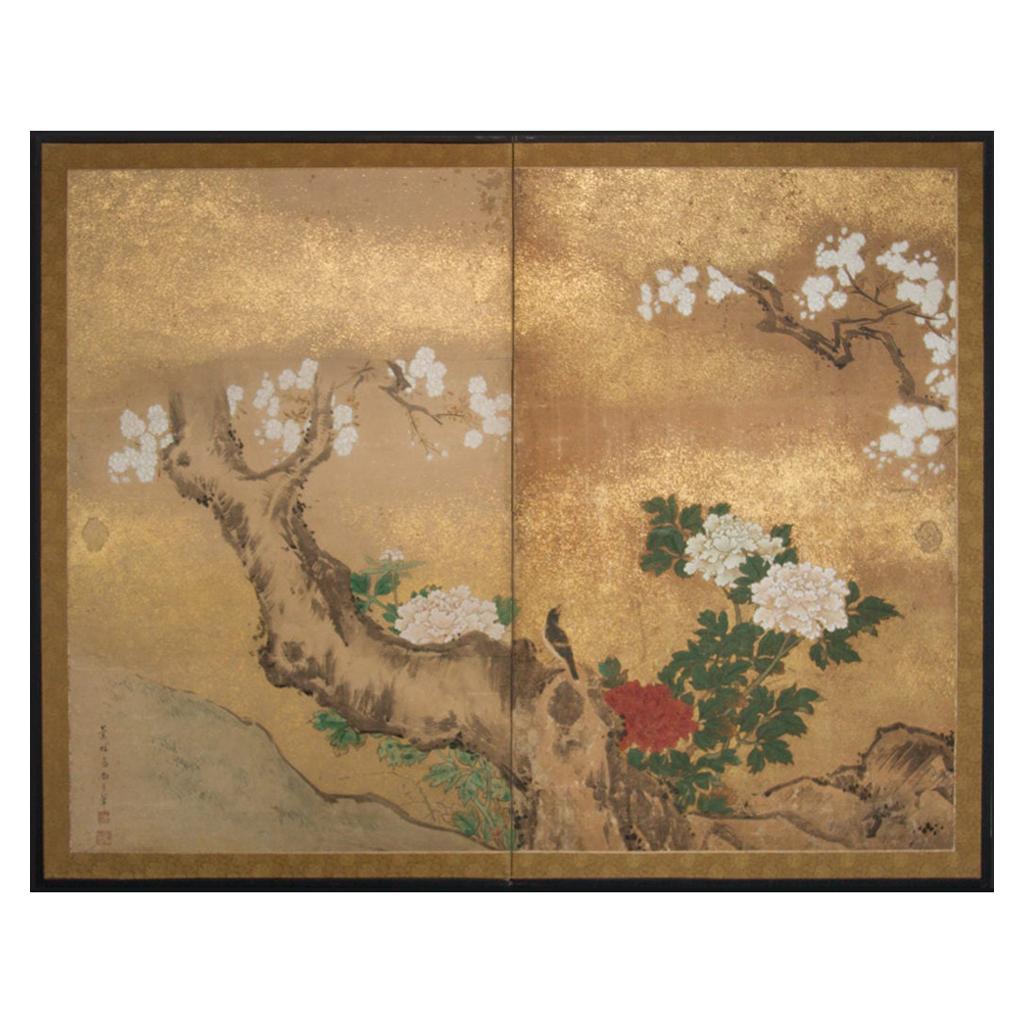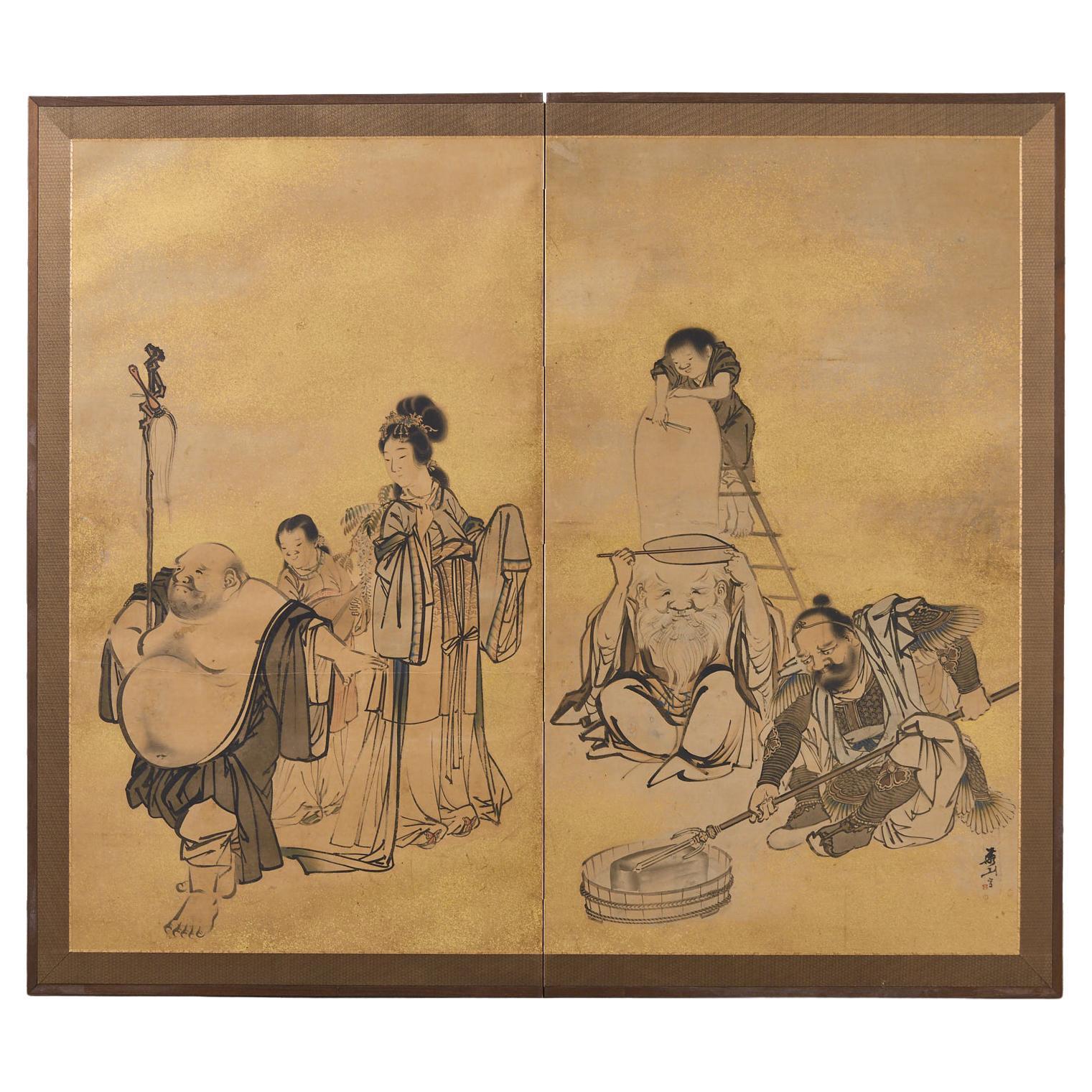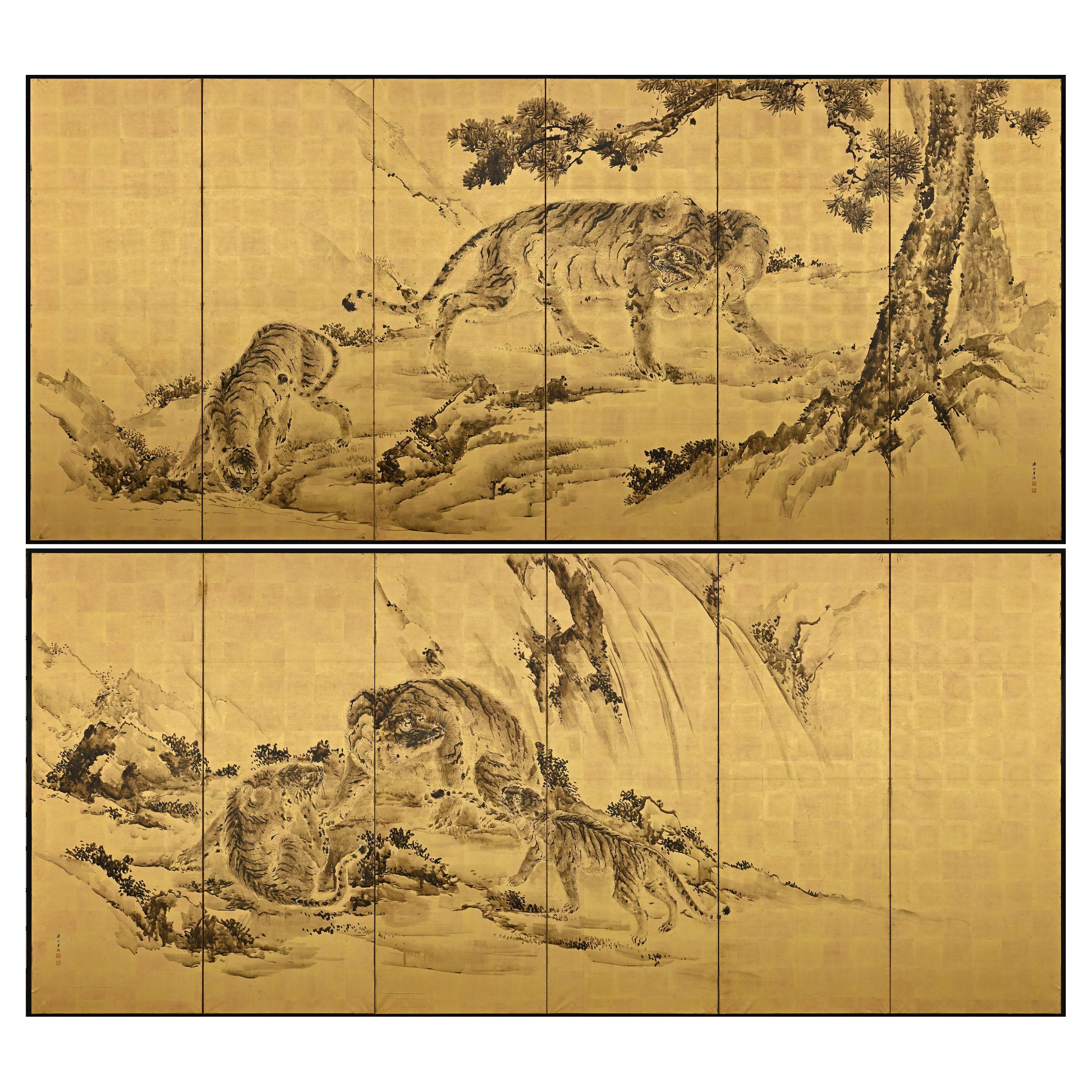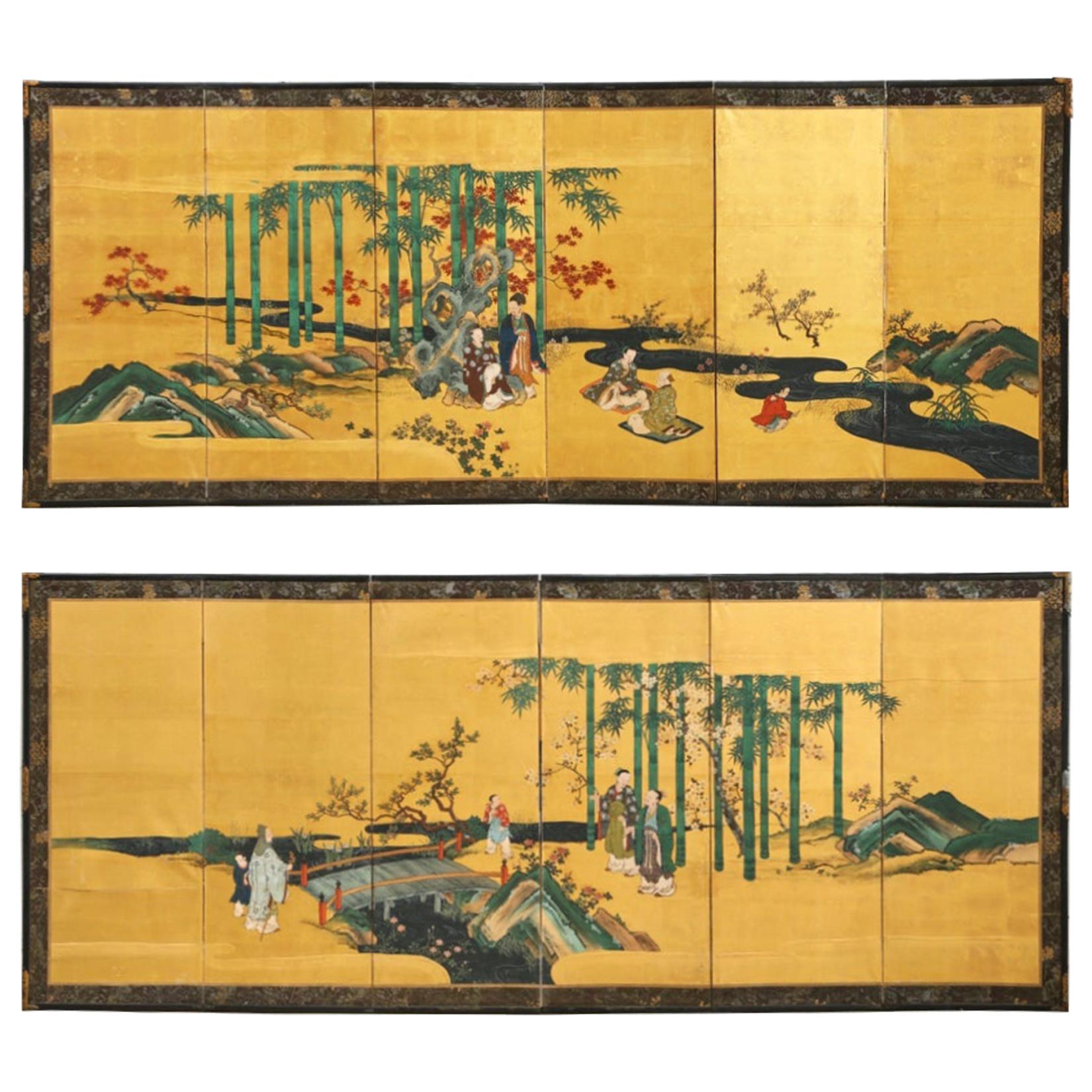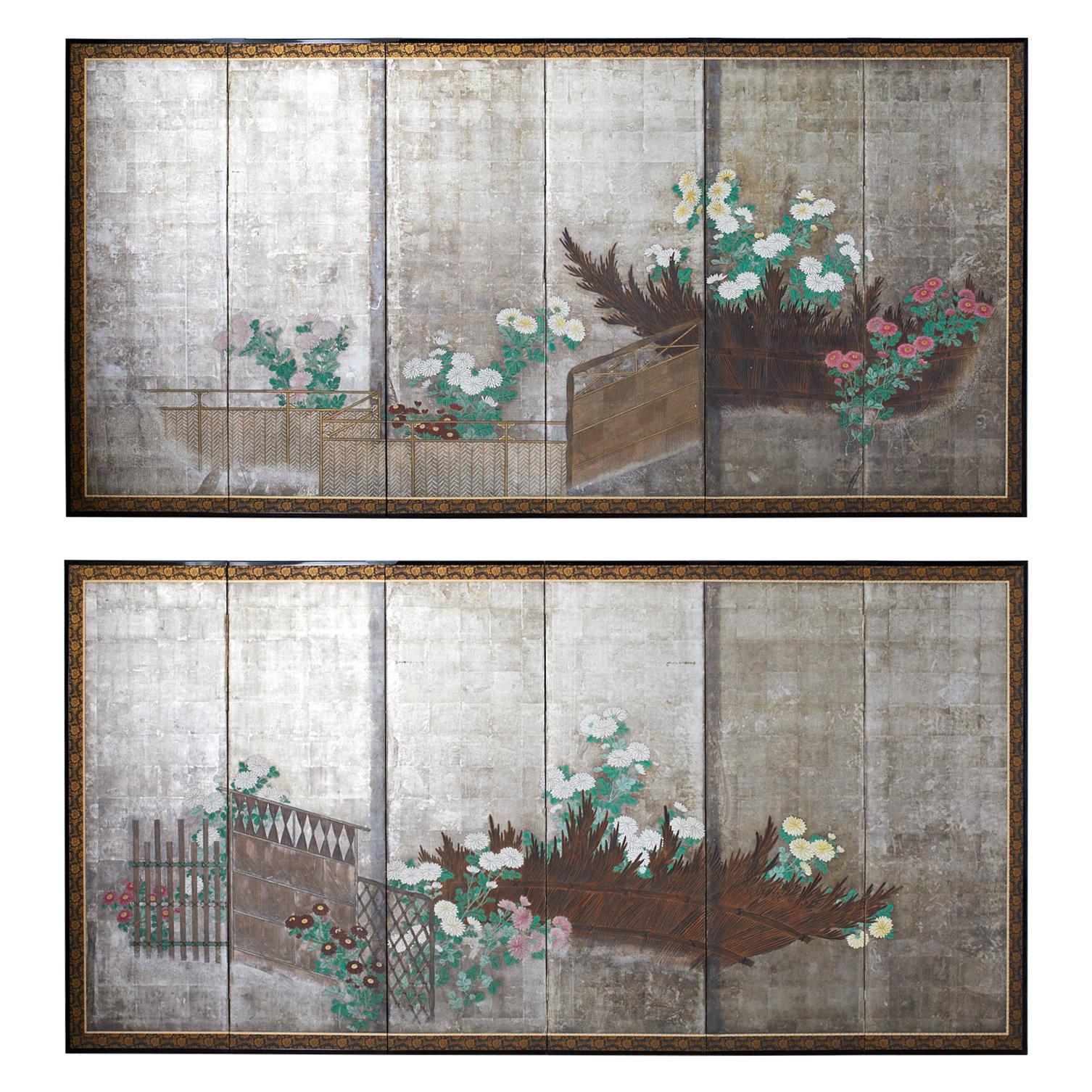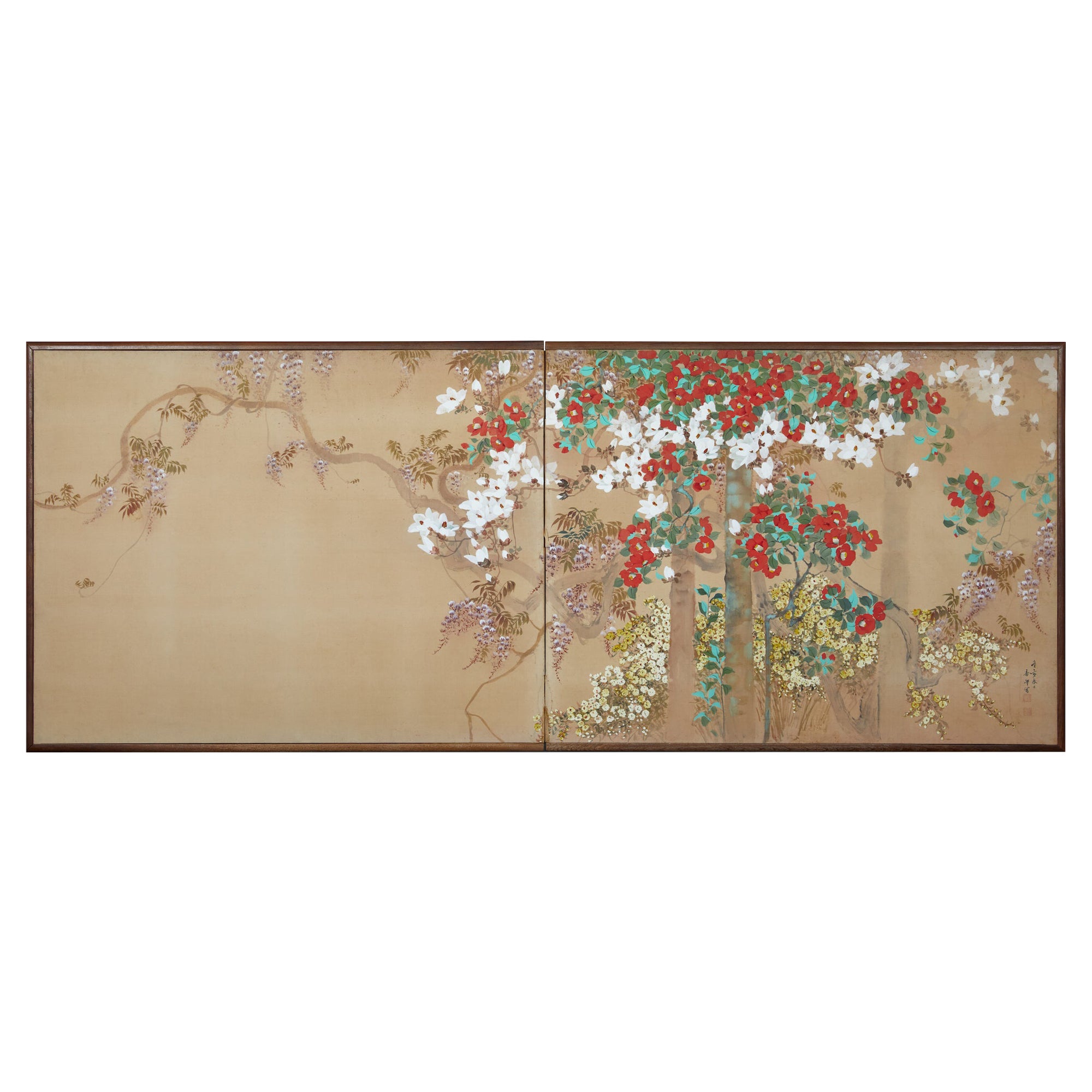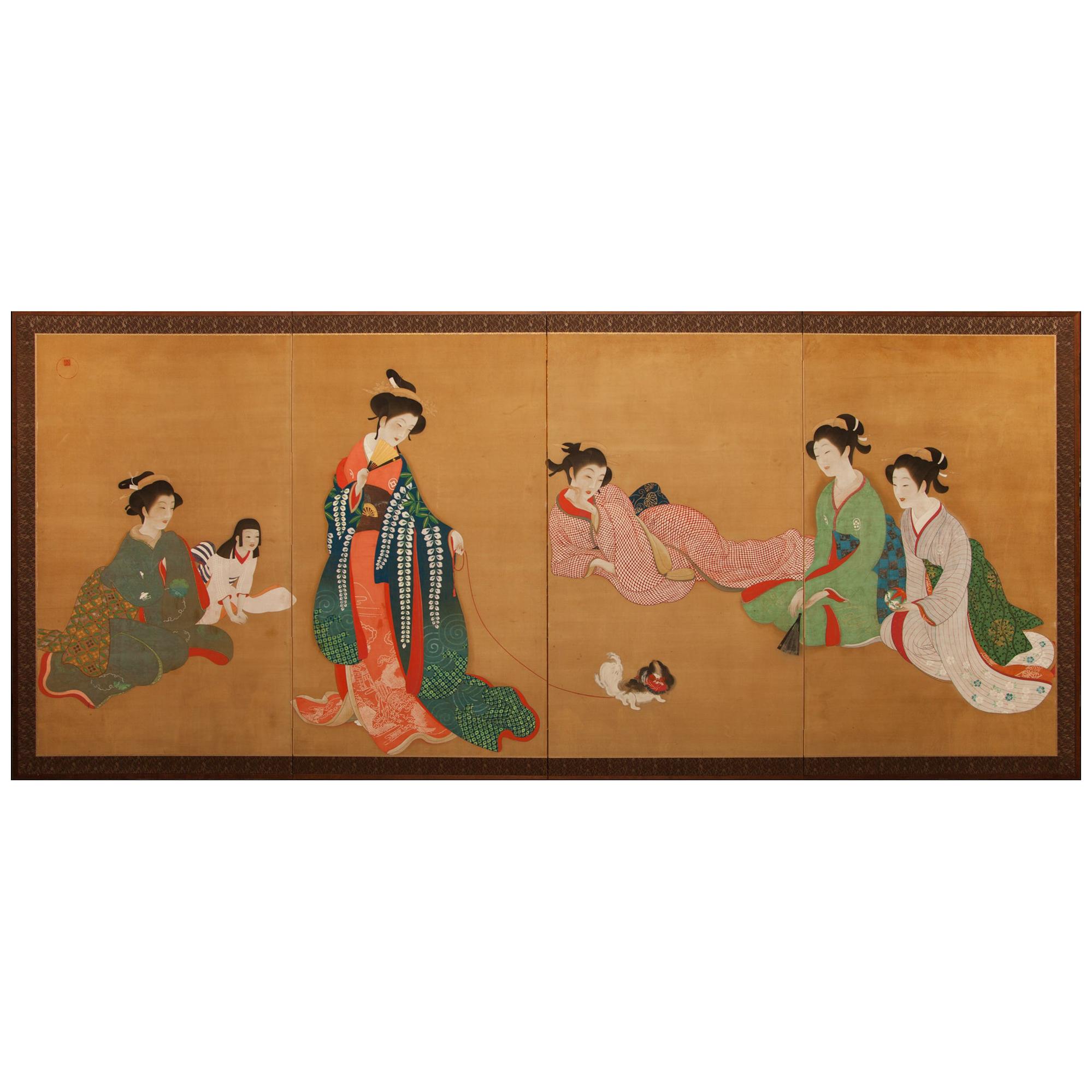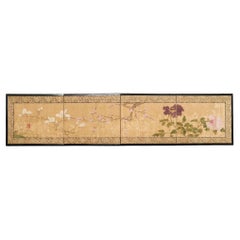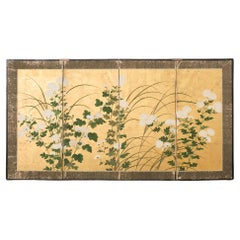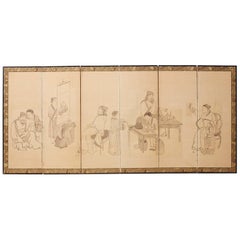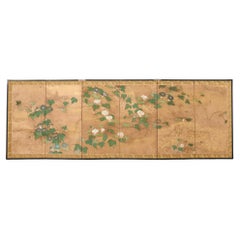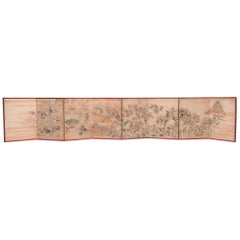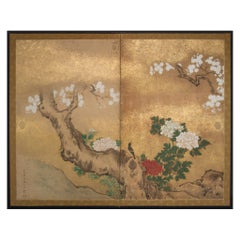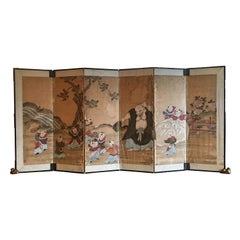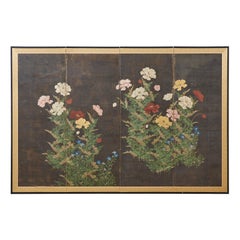
Japanese Edo Period Four Panel Screen Flowering Peony
View Similar Items
Want more images or videos?
Request additional images or videos from the seller
1 of 21
Japanese Edo Period Four Panel Screen Flowering Peony
Price:$5,600
$7,000List Price
About the Item
- Dimensions:Height: 67 in (170.18 cm)Width: 99.5 in (252.73 cm)Depth: 0.75 in (1.91 cm)
- Style:Edo (Of the Period)
- Materials and Techniques:
- Place of Origin:
- Period:
- Date of Manufacture:19th Century
- Condition:Wear consistent with age and use. Beautifully crafted with a faded aged and tarnished patina as seen in photos. Age appropriate wear. Flowers retrouched later.
- Seller Location:Rio Vista, CA
- Reference Number:1stDibs: LU1555224976512

About the Seller
5.0
Erin Lane Estate is based in the San Francisco Bay Area, and its team of furniture restorers, art curators, professional appraisers and Asia specialists sources prime vintage and antique furniture from the finest estates in Northern and Southern California. Erin Lane Estate specializes in Hollywood Regency, McGuire, Chinese and Japanese pieces.
Diamond Seller
Premium sellers with a 4.7+ rating and 24-hour response times
Established in 2000
1stDibs seller since 2015
2,984 sales on 1stDibs
Typical response time: 1 hour
Authenticity Guarantee
In the unlikely event there’s an issue with an item’s authenticity, contact us within 1 year for a full refund. DetailsMoney-Back Guarantee
If your item is not as described, is damaged in transit, or does not arrive, contact us within 7 days for a full refund. Details24-Hour Cancellation
You have a 24-hour grace period in which to reconsider your purchase, with no questions asked.Vetted Professional Sellers
Our world-class sellers must adhere to strict standards for service and quality, maintaining the integrity of our listings.Price-Match Guarantee
If you find that a seller listed the same item for a lower price elsewhere, we’ll match it.Trusted Global Delivery
Our best-in-class carrier network provides specialized shipping options worldwide, including custom delivery.More From This Seller
View AllJapanese Edo Four Panel Screen Flowering Peony Prunus Magnolia
Located in Rio Vista, CA
Early 19th century Japanese Edo/Tokugawa period four panel folding byobu table screen featuring peony, prunus, and magnolia. Painted with ink and natural color pigments on silk with ...
Category
Antique 19th Century Japanese Edo Paintings and Screens
Materials
Brass
Japanese Edo Four Panel Screen Flowering White Chrysanthemums
Located in Rio Vista, CA
19th century extraordinary Japanese late Edo/early Meiji period four-panel byobu screen featuring flowering white chrysanthemums painted in a moriage (raised pigment) style. The pain...
Category
Antique 19th Century Japanese Edo Paintings and Screens
Materials
Brass, Gold Leaf
Japanese Edo Period Six Panel Screen of Chinese Scholars
Located in Rio Vista, CA
Fascinating 19th century Japanese late Edo period six pane funpon screen. Large scale depicting Chinese scholars and officials engaged in leis...
Category
Antique 19th Century Japanese Edo Paintings and Screens
Materials
Silk, Wood, Paper
Japanese Edo Six Panel Screen Flowering Morning Glory
Located in Rio Vista, CA
Spectacular 19th century late edo period six panel byobu screen featuring flowering morning glory vines (as-agao). Machi-eshi or anonymous town artist painter crafted in an amalgamat...
Category
Antique 19th Century Japanese Edo Paintings and Screens
Materials
Brass
Japanese Edo Six Panel Screen Yoshitsune and Benkei
Located in Rio Vista, CA
Spectacular 19th century Japanese late Edo period six-panel byobu screen depicting Yoshitsune and Benkei, two heroes of Japanese folklore. Crafted in ink and natural color pigments on mulberry paper with thick gold leaf borders on each panel. The character Yoshitsune is seated under a blossoming cherry tree in full armor holding a fan. The warrior priest or monk Benkei is depicted kneeling on a leopard skin...
Category
Antique 19th Century Japanese Edo Paintings and Screens
Materials
Brass, Gold Leaf
$3,400 Sale Price
29% Off
Japanese Edo Two Panel Screen Deities by Yokoyama Kazan
Located in Rio Vista, CA
Whimsical Japanese late Edo period two-panel screen circa 1800 by Yokoyama Kazan (Japanese 1784-1837). The screen depicts four of the seven Gods or deities ...
Category
Antique 19th Century Japanese Edo Paintings and Screens
Materials
Brass, Gold Leaf
You May Also Like
Japanese Edo Period Festival Screen, c. 1750
Located in Chicago, IL
This 18th century folding screen is a stunning example of Japanese artistry. Beautifully painted with delicate brushwork, the evocative sc...
Category
Antique Mid-18th Century Japanese Edo Paintings and Screens
Materials
Paper
Japanese Two-Panel Screen Peony and Cherry
Located in Hudson, NY
Japanese two-panel screen: Peony and Cherry, Edo period (circa 1800) painting, formerly fusuma (Japanese sliding doors), executed in the Kano school style, featuring a cherry tree in...
Category
Antique Early 1800s Japanese Edo Paintings and Screens
Materials
Gold Leaf
Pair of Japanese Edo Period Six-Panel Screen, "100 Boys at Play"
Located in Austin, TX
An absolutely charming pair of Japanese Tosa School six-panel folding screens painted with the "One Hundred Boys at Play" motif, featuring a multitude...
Category
Antique Early 19th Century Japanese Edo Paintings and Screens
Materials
Gold Leaf
Japanese Six Panel Screen with Hotei, Edo Period, Early 19th Century
Located in Austin, TX
A delightful Japanese six panel painted paper screen featuring the beloved figure Hotei, Edo Period, early 19th century.
Hotei, called Budai in China, and known as the Laughing Buddha or Fat Buddha in the West, is considered to be an emanation of Maitreya, the Buddha of the Future.
In Japan, he also holds a special place as one of the Seven Lucky Gods, being the god of fortune, and protector of children.
He is always portrayed as a mirthful and corpulent man, dressed in loose robes that show off his round belly. He carries a sack with him, said to be filled with treasure. As the protector of children, he is often portrayed with them playing on or around him, as he is here. The children portrayed in this screen are dressed in Chinese style clothing...
Category
Antique Early 19th Century Japanese Edo Paintings and Screens
Materials
Silk, Paper
Japanese Two Panel Screen: Flowering Vines and Wisteria
Located in Hudson, NY
Wisteria represents sentiments of love and longevity as vibrant floral colors dance dramatically amongst the two panels. Mineral pigments on Mulberry paper with a natural wood trim....
Category
Early 20th Century Japanese Paintings and Screens
Materials
Wood, Paper
Japanese Screen Pair, Tigers by Kishi Renzan, Late Edo Period
Located in Kyoto, JP
Kishi Renzan (1804-1859)
Tigers
Pair of six-panel Japanese screens.
Ink and gold-leaf on paper.
In this monochromatic pair of six-fold Japanese screens painted on gold-leaf, Kishi Renzan has created a breathtaking composition of a family of tigers. The screens are filled with a sense of drama which is conveyed by both the subject matter and the wet, expressive brushwork. The running mountain stream and the towering waterfall allude to refreshment during the summer months and we feel the tiger families familiarity and security within their environment. Renzan’s master, Kishi Ganku...
Category
Antique Mid-19th Century Asian Edo Paintings and Screens
Materials
Gold Leaf
Recently Viewed
View AllMore Ways To Browse
Chinese Byobu
Silver Byobu
Japanese Silk Painting Bird
Byobu Japanese Screen Painting
Japanese Screen With Birds
Japanese Screens Showa Period
Chinese Hand Fan
Chinese Stone Panel
Coromandel Lacquer
Asian Wood Wall Panels
The Imperial Palace Of China
18th Century Chinese Screen
Two Panel Folding Screen
Chinese Coromandel
Tiger Screen
Chinese Paper Scroll
Asian Room Divider Screen
Rare Chinese Screens
